The Dutch government is expected to reimpose restrictions on nightclubs, music festivals and restaurants in response to a surge in Covid-19 infections among young adults, local media reported.
The Netherlands lifted most lockdown measures on 26 June, as cases were falling and around two-thirds of the population has received at least one vaccination shot.
But, with bars, restaurants and nightclubs open again, new cases have risen at the fastest pace in months, with more than 5,400 cases reported over the 24-hours through yesterday.
That compared to fewer than 1,000 a week earlier.
Prime Minister Mark Rutte is expected to announce the decision at a news conference this evening, news agency ANP reported.
The country is not expected to return to a widespread lockdown, but is widely expected to take targeted measures to limit the spread of infections among teenagers and young adults.
Broadcaster RTL said cafes and bars would be ordered to close at midnight, and outdoor events would be limited a maximum of 1,000 visitors and no more than 500 people allowed to attend indoor gatherings.
Around three-quarters of new cases in the Netherlands are occurring among young people and more than half are of the more infectious Delta variant, Dutch Health Minister Hugo de Jonge said this week.
Malta closes borders to unvaccinated travellers
Malta has become the first European country to close its borders to anyone who has not been fully vaccinated against coronavirus, following a spike in cases of Covid-19.
Health minister Chris Fearne said the measure would come into force on 14 July 14 adding: "We will be the first country in Europe to take this step."
Malta has been hailed as a European success story for its vaccination campaign against coronavirus, with 79% of the adult population fully vaccinated.
But from reporting no new cases and having just 28 active cases on 27 June, the Mediterranean island nation on Friday reported 96 new cases of the virus, taking the total number of active cases up to 252.
"From Wednesday 14 July, anyone coming to Malta must be in possession of a recognised vaccination certificate: a Maltese certificate, a British certificate, or a European Union certificate," Mr Fearne told reporters.
He said that around 90% of the cases being found are among unvaccinated people, and that many have been traced to English Language Schools.
Cases have been found at nine schools so far, and as a result, all English Language Schools will have to shut their doors from 14 July.
The Maltese government recently had launched a financial incentive scheme to attract language students to the country from abroad.
Sydney tightens lockdown as Delta outbreak intensifies
A lockdown in Australia's largest city was tightened, as new Covid-19 infections hit a record and authorities warned an outbreak of the Delta variant was spinning out of control.
"Do not leave your home unless you absolutely have to," state premier Gladys Berejiklian told Sydney's five million residents, as the city recorded 44 new cases in 24 hours.
Sydney is now in its third week of lockdown, but continues to post record new infections among a population that is overwhelmingly unvaccinated.
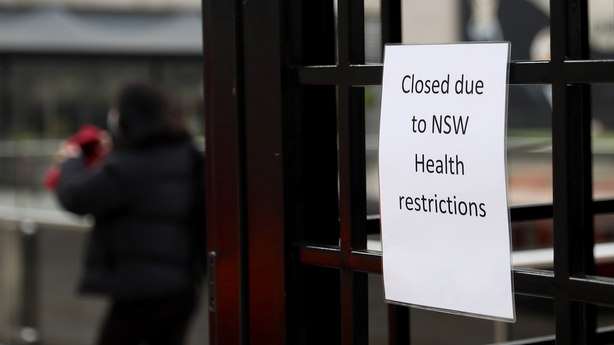
Ms Berejiklian tried to shock New South Wales residents into compliance, warning they were facing the greatest threat to their safety "since the pandemic started", following a lack of adherence to stay-at-home rules.
Sydney has seen 439 new infections since mid-June.
That number is low compared to most global cities, but Australia has so far prevented widespread community transmission and just nine percent of the population are fully vaccinated.
"We do not have the luxury of considering living with this virus," Ms Berejiklian warned, adding residents "need to turn the tide" if thousands of deaths are to be avoided.
Under the new lockdown rules, outdoor exercise in groups of more than two will be banned and existing bans on non-essential trips will be more strictly enforced.
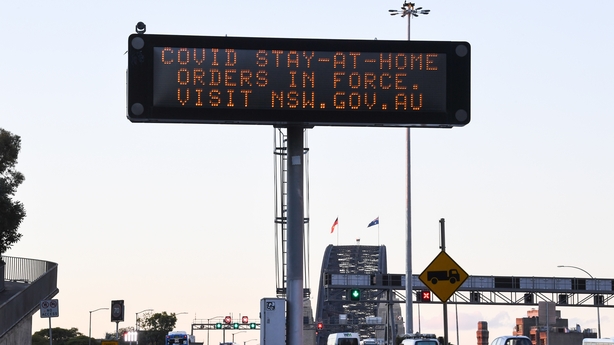
"What we need is for everyone to follow the rules that are in place," said Ms Berejiklian. "This strain, the Delta
is more contagious than anything we have seen."
Vietnam's biggest city enters two-week coronavirus lockdown
Vietnam's economic hub Ho Chi Minh City has begun a two-week lockdown in the hope to contain the country's worst Covid-19 virus outbreak.
The city of nine million had previously been subjected to travel restrictions for a month but infection rates were steadily rising - with more than 9,400 cases registered.
Before the outbreak kicked off in late April, Vietnam had recorded fewer than 3,000 cases across the entire country.
Vietnamese authorities are not using the term lockdown but are calling the measures "social isolation orders".
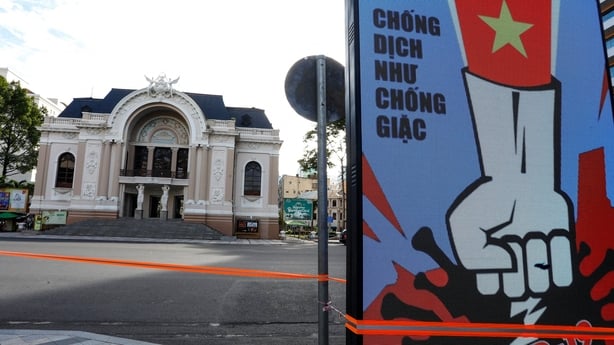
Ho Chi Minh City residents are now barred from gathering in groups larger than pairs in public, and people are only allowed to leave home to buy food, medicine and in case of emergencies.
Police have set up check-points at city borders and only those with negative test results can get in.
Airlines can carry a maximum of 1,700 passengers to the capital Hanoi per day, aviation authorities said, while trains between Vietnam's two major destinations have been suspended.
Vietnam had once been hailed as a model for virus containment as a result of extensive contact tracing and strict quarantine rules.
All close contacts of virus patients have been put under state-controlled quarantine facilities.
Ho Chi Minh City was the first to adjust the strict policy, allowing close contacts to home quarantine because state-run isolation centres are overloaded.
Earlier state media reported more than 80 inmates and guards had tested positive at the city's Chi Hoa jail.
Gunshots rang out from inside the prison on Tuesday, but it remains unclear what had happened.
Vietnam is juggling its desire to contain the virus with its economic growth goals.
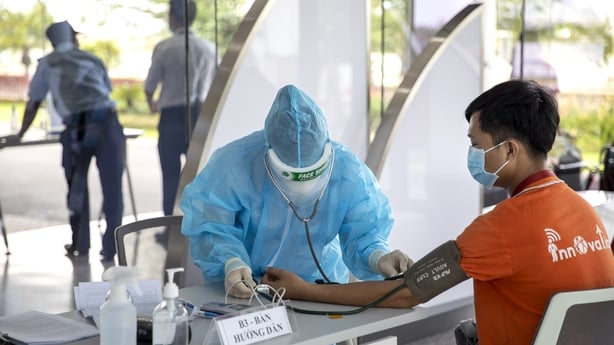
The country has been among the best performing economies in Asia, reporting strong growth of 6.61% in the second quarter.
Vietnam, which has a population of close to 100 million, has administered almost four million doses of Covid-19 vaccines.
Authorities want to reach herd immunity by the end of the year or early 2022.
Vietnam is developing its own vaccines and has ordered millions of doses from abroad.
'No jabs, no job': Fiji to make vaccine compulsory
Fiji has announced plans to make the coronavirus vaccine compulsory for all workers as it battles a runaway outbreak of the Delta variant, with the prime minister issuing a blunt message: "no jabs, no job".
Frank Bainimarama said all public servants in the South Pacific nation of 930,000 must go on leave if they have not had their first injection by 15 August and would be dismissed if they did not receive their second by 1 November.
Private sector employees must have their first jab by 1 August, with individuals facing hefty fines if they fail to comply and companies threatened with being shut down.
"No jabs, no job - that is what the science tells us is safest and that is now the policy of the government and enforced through law," Mr Bainimarama said in a national address.
The hardline policy comes amid government frustration at the widespread flouting of virus safety measures such as social distancing and wearing masks, blamed in part for a huge spike in infections.
Until April, Fiji had recorded no community cases for a year but a quarantine breach saw the highly contagious Delta variant, first detected in India, rapidly gain a foothold, with the country now recording 700-plus new cases a day.
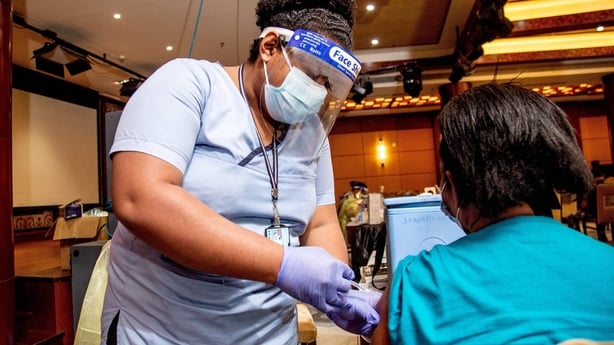
The under-resourced health system has been stretched to breaking point, with the country's largest hospital in Suva this week saying its mortuary was at capacity and urging the families of virus victims to collect their loved ones.
Mr Bainimarama has resisted calls to lock down the entire country, citing the economic cost and the practicalities of enforcing such a move in densely-populated squatter settlements.
"A hard lockdown, as some are calling for, cannot be strictly enforced everywhere in Fiji and our experts tell us it would not kill off the virus," he said.
"But it would kill jobs and it could kill our country's future."
Instead, Mr Bainimarama has imposed localised lockdowns in infection hotspots, including the capital Suva, while rolling out the Astra Zeneca vaccine.
While almost 340,000 adults have received their first injection, Mr Bainimarama said online misinformation was discouraging some people, assuring them he had experienced no side effects from the inoculation.
"I have not been magnetised or micro-chipped by the vaccine, I have not received the mark of the beast or any other creature - the vaccine does not do that to anyone," he said.
Mr Bainimarama said spot fines were being introduced for "reckless rule-breakers" who did not wear marks, attended social gatherings or violated quarantine orders.
"My fellow Fijians, the end of this ordeal will come," he said.
"Until it does, we must remain vigilant until more of us are protected -- get vaccinated, wear your mask, maintain physical distance from others."

